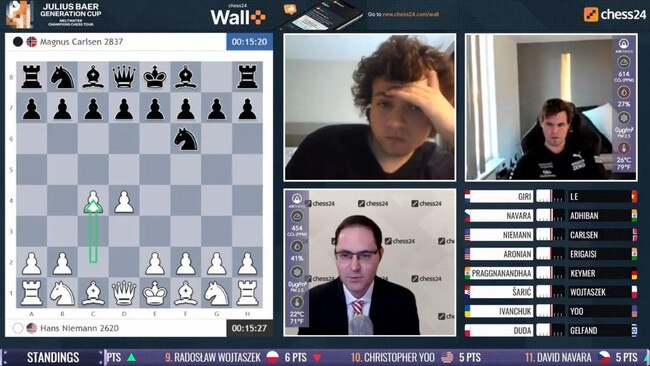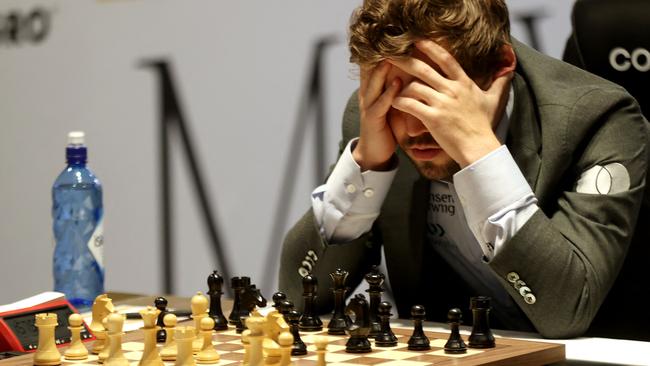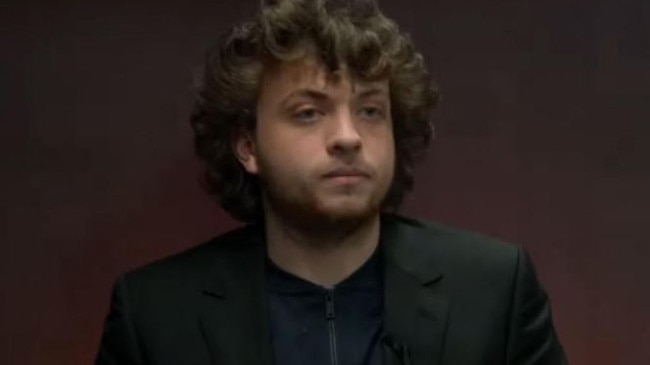The cheating scandal rocking the chess world
World champion Magnus Carlsen accuses rival Hans Niemann of foul play.

World champion Magnus Carlsen accuses rival Hans Niemann of foul play.
Magnus Carlsen’s attacks on the chess board had ensured his status as world champion for ten years. But his attacks off the board on Hans Niemann, a rising star who scored a surprise victory against him earlier this month, have created a scandal for the sport.
Carlsen, 31, openly accused Niemann, 19, of cheating for the first time on Monday in a statement posted on Twitter.
Chess commentators had already assumed that Carlsen believed Niemann was a cheat after two incidents. Carlsen walked out of the Sinquefield Cup tournament in St Louis, Missouri after losing a game to Niemann on September 5. He resigned after one move in an online game against Niemann on September 19 that was part of the Julius Baer Generation Cup, which Carlsen went on to win.

Niemann has admitted to cheating when he was 12 and 16 by using a computer to tell him the best moves but denies cheating in games played over the board.
Carlsen posted a statement on Twitter stating that Niemann has cheated more often than he has let on.
“I believe that cheating in chess is a big deal and an existential threat to the game,” Carlsen wrote.
“I also believe that chess organisers and all those who care about the sanctity of the game we love should seriously consider increasing security measures and methods of cheat detection for over the board chess.”
He said that he had “strongly considered” withdrawing from the Sinquefield Cup when he learnt that Niemann had been invited but chose to play.

“I believe that Niemann has cheated more — and more recently — than he has publicly admitted. His over the board progress has been unusual, and throughout our game in the Sinquefield Cup I had the impression that he wasn’t tense or even fully concentrating on the game in critical positions, while outplaying me as black in a way I think only a handful of players can do. This game contributed to changing my perspective.”
He suggested that he would boycott any game in which he was paired with Niemann.
Niemann has previously challenged critics to present evidence of him cheating.
“The silence of my critics clearly speaks for itself. If there was any real evidence, why not show it?”
He said in an interview with the St Louis Chess Club that he was “completely clean”.
“If they want me to strip fully naked, I’ll do it,” Niemann said.

Dominic Lawson, president of the English Chess Federation, said that Carlsen was making “an assertion without evidence”.
He said that people who have used a computer to analyse the Carlsen v Niemann game had found that Niemann’s moves were roughly a 70 per cent match to the computer’s choices.
“[That] is extremely high but not out of the ordinary. Carlsen’s score was below 50 per cent, which is extraordinarily low for him. So he played, for him, very badly.”
Lawson said that there was not a threshold that proved cheating. “The higher it is, the more suspicious people get. People have identified games by Niemann that have scores of 100 per cent, which has aroused suspicion, but these were short tactical games.”
Lawson suggested that Carlsen may have underperformed because he was rattled by the idea that he was playing a cheat.
“I’m afraid that cheating in online chess is quite common but there are few examples found over the board, let alone in a globally followed tournament where cameras are everywhere. It would be like Mission: Impossible.
“I’ve spoken to friends who are grandmasters who believe Carlsen. They will point to games that Niemann has played and say: ‘I find this very hard to believe that this could come from a human.’ That’s their gut feeling.”
He added that the World Chess Federation would have to intervene because tournaments would be pressured not to invite Niemann because of the threat of a boycott by the world champion.
Lawson suggested that Niemann should be given the benefit of the doubt.
“I think there’s a huge difference between cheating as a child in random online games and cheating in a tournament over a board in a game broadcast globally.”


